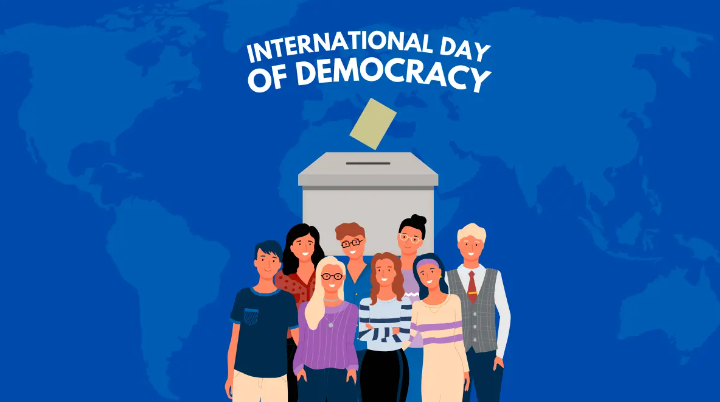International Day of Democracy 2024 (GS Paper 2, Polity)

Context
- Every September 15, the world observes the International Day of Democracy, a day dedicated to celebrating and reinforcing democratic principles.
- Established by the United Nations General Assembly in 2007, this day serves as a powerful reminder of the importance of democracy in fostering societal progress and human rights.
Historical Background
Origins in the ICNRD Process
The concept of an International Day of Democracy has its roots in the International Conferences on New and Restored Democracies (ICNRD) process, which began in 1988. Initiated by President Corazon C. Aquino of the Philippines, this series of conferences aimed to:
- Promote New Democracies: Support emerging democracies in establishing and consolidating democratic institutions and practices.
- Restore Democracy: Assist countries transitioning from authoritarian rule in rebuilding democratic frameworks and processes.
These conferences provided a platform for international dialogue on democratic values and practices, laying the groundwork for future global initiatives.
The Universal Declaration on Democracy
A significant step toward formalizing the International Day of Democracy was the adoption of the Universal Declaration on Democracy by the Inter-Parliamentary Union (IPU) in 1997. This declaration:
- Affirmed Core Principles: It reinforced fundamental democratic principles, such as the rule of law, respect for human rights, and the importance of free and fair elections.
- Guided Democratic Governance: It offered a framework for implementing democratic governance and ensuring its effectiveness.
- Foundation for the Day: It provided a foundational document that informed and supported the establishment of an official International Day of Democracy.
The Doha Conference and UN Resolution
The establishment of the International Day of Democracy was solidified through key events:
- ICNRD Sixth Conference (2006): Held in Doha, Qatar, this conference emphasized the collaborative nature of democracy, involving governments, parliaments, and civil society. It concluded with a declaration and Plan of Action that reaffirmed the importance of democratic values.
- UN General Assembly Resolution (2007): On November 8, the UN General Assembly adopted a resolution officially establishing September 15 as the International Day of Democracy. The date was chosen to coincide with the anniversary of the Universal Declaration on Democracy, linking the day’s observance to the core values outlined in the declaration.
International Day of Democracy 2024
Theme: “Artificial Intelligence as a Tool for Good Governance”
The theme for 2024 focuses on the role of Artificial Intelligence (AI) in governance. It highlights:
- Responsible AI Governance: The need for effective regulation and oversight of AI technologies to ensure they are used ethically and transparently.
- Balancing Benefits and Risks: Harnessing the potential benefits of AI, such as efficiency and data-driven decision-making, while addressing risks like bias and privacy concerns.
- UN Secretary-General’s Call: Aligning with UN Secretary-General Antonio Guterres’ emphasis on responsible AI development and deployment.
This theme reflects contemporary challenges and opportunities in democratic governance, as technology increasingly influences public policy and administration.
Past Themes
Previous International Day of Democracy themes have explored various aspects of democratic governance, including:
- Building Stronger Democracies: Focusing on strengthening democratic institutions and practices.
- Democracy and Sustainable Development Goals: Exploring how democratic governance supports the achievement of UN Sustainable Development Goals.
- Amplifying Citizens’ Voices: Promoting greater participation and engagement in democratic processes.
- Fostering Dialogue and Inclusiveness: Encouraging inclusive dialogue among diverse societal groups.
- Promoting Accountability: Highlighting the importance of transparency and accountability in governance.
- Encouraging Political Tolerance: Advocating for respect and tolerance in political discourse.
Significance and Impact
Global Review of Democracy
The International Day of Democracy provides an opportunity to:
- Assess Democracy Worldwide: Evaluate the state of democracy in various countries and regions.
- Identify Challenges: Recognize obstacles to democratic governance, such as corruption, inequality, and repression.
- Promote Dialogue: Foster discussions on how to address these challenges and strengthen democratic practices.
Essential Elements of Democracy
The day emphasizes several core democratic values:
- Freedom: Fundamental freedoms such as speech, assembly, and the press.
- Human Rights: The protection and promotion of individual rights and liberties.
- Periodic Elections: Regular, free, and fair elections that reflect the will of the people.
These elements are essential for creating an environment where human rights can be fully realized and protected.
UNESCO’s Role
The United Nations Educational, Scientific and Cultural Organization (UNESCO) plays a significant role in supporting democratic principles:
- Supporting Democratic Development: Assisting in the establishment and consolidation of democratic institutions.
- Assisting During Transitions: Providing support during periods of democratic transition or reform.
- Promoting Democratic Values: Upholding the ideals of democracy, including human dignity and mutual respect.
UNESCO’s Focus Areas
UNESCO’s work in democracy promotion includes:
- Freedom of Expression: Supporting the right to free and open communication.
- Education for Democratic Citizenship: Promoting educational programs that foster democratic values and civic engagement.
- Youth Empowerment: Encouraging young people to participate in democratic processes and decision-making.
- Advancing Scientific Progress: Supporting the right to scientific advancement and innovation.
- Promoting Universal Values: Advocating for tolerance, pluralism, and human rights on a global scale.
Global Celebrations and Activities
International Day of Democracy is marked by a range of activities across the globe, such as:
- Photo Competitions: Showcasing images that capture the essence of democracy and its impact.
- Workshops for Children: Educating young people about democratic values and processes.
- Live Debates: Engaging discussions on key democratic issues and challenges.
- Radio Phone-Ins: Interactive programs allowing public participation and dialogue.
- Meetings with Civil Society Organizations: Bringing together stakeholders to discuss and promote democratic practices.
These events reflect the global commitment to reinforcing and advancing democratic values, engaging communities in meaningful ways, and addressing contemporary challenges in democratic governance.


